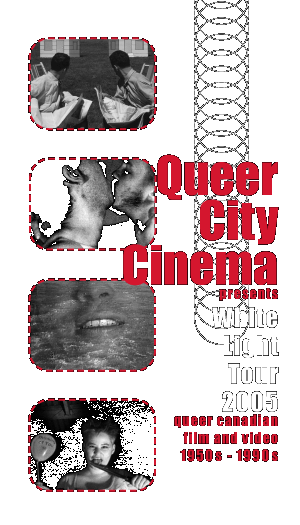












Archives Gaies du Quebec White Light 1 - 7:30 PM
Canadian Queer Cinemas:
The Postwar Era (1945-1965)
Curated by Thomas Waugh
These six shorts were made in Montreal and Ottawa in the two decades following World War II, respectively from the artisanal underground in Canada's metropolis, Montreal, and from the public sector at the National Film Board of Canada (still banished up in Ottawa until 1957) that constituted the most visible realm of Canadian cinemas until the late sixties. The Omnibus Act that partly decriminalized sodomy in 1969 was still light years away - much less Stonewall south of the border the same year - and these works thus constitute a kind of illicit pre-history of our queer cinemas, rather than their first tentative steps. Aside from The Feeling of Hostility (a chilling statement from the hegemonic institution of psychiatry as to what's wrong with successful single women), the five other works are all are by queer artists. But even though these three men were relatively uncloseted in relation to the norms of those dark Cold War years of persecution by the state and the psychiatrists, they had to work through private codes, either consciously or unconsciously, to express a queerly subjective view of the world. Curatorial guidelines have prevented me from programming the two great pioneering queer features of the sixties from Montreal and Toronto respectively, A tout prendre (Claude Jutra, 1963, 99 min.) and Winter Kept Us Warm (David Secter, 1965, 81 min.) But our national cinematic culture included no Derens, Warhols, Jack Smiths, or Angers, not to mention Viscontis or Cocteaus, in those formative decades after the War. It may thus be better that its queer artistic undercurrents be rediscovered, not through feature narrative films, but through codes, glimpses, fragments, and intimations of the intense desire stirring below the surface.
Le dément du Lac Jean-jeunes (The madman of Lac Jean-jeunes)
Claude Jutra, 1948, 16mm, VHS transfer, 40:00 min., orig. French version, English summary provided
Eighteen-year-old cinephile Claude Jutra took his new camera to the woods and for his first movie produced this delirious fantasy of boy scouts camping out, an abused boy, a demented father, and sun sifting through the leaves on naked calfflesh and splashing water. Juvenilia in more than one sense of the word.
Mouvement perpétuel (Perpetual motion)
Claude Jutra, 1949, 16mm, VHS transfer, 15:00 min.
The eternal homosocial triangle. Which queer filmmaker was nineteen-year old Claude's chief influence, Eisenstein, or another teenager, Kenneth Anger, whose hot-off-the-Steenbeck Fireworks Claude might have just seen?
The Feeling of Hostility
Robert Anderson, 1948, 35mm, VHS transfer, 32:00 min.
From the National Film Board's "Mental Mechanisms" series, a Mädchen in Ottawa docu-drama about a girl who just can't fit in. The voice of psychiatry explains how to compensate for your man-hating frigidity through wardrobe. "Love is fascinating but very dangerous."
Neighbours
Norman McLaren, 1952, 35mm, DVD transfer, 8:00 min.
The famous pixillated parable about war in general and the Korean conflict in particular, but also a modernist same-sex pas-de-deux that riffs on gender insecurity and queer desire? Some men feel very strongly about flowers.
A Chairy Tale
Norman McLaren and Claude Jutra, 1957, 35 mm, DVD transfer, 10:00 min.
Another pixillated parable, this time with McLaren joined by his acolyte Jutra in the director's chair as well as onscreen. Unlike the gender-extremist Neighbours, this tale is very pronoun-avoidant and gender-ambiguous, and it's not clear in this wrangle between the handsome young male intellectual and the chair that doesn't want to be bottom until s/he's been top who gets the tail and who loses the cherry. All must be negotiated onscreen, and the film, rather than being about geopolitics, seems to be exactly about what it seems to be about, the couple, all couples.
On the Rocks
Alan B. Stone, c. 1963, 8mm, VHS transfer, 5:00 min.
A lurid poser from Canada's beefcake king of the 1960s. While Stone is much more of a photographer than a filmmaker, and he can't exactly let it all hang out, addressing desire is the first step, er, pose, isn't it?
Total running time: 110 min.